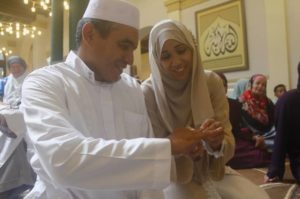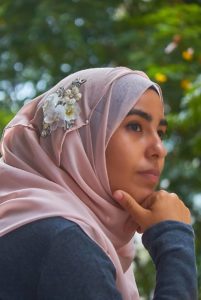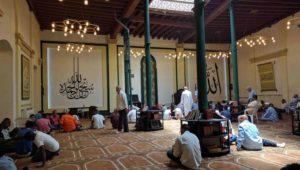 ABREN EN CUBA TIENDA DE MODA ISLAMICA PARA LOS CUBANOS MUSULMANES.
ABREN EN CUBA TIENDA DE MODA ISLAMICA PARA LOS CUBANOS MUSULMANES.
La mezquita Abdallah es la única de su tipo en Cuba y está situada en la céntrica calle Oficios, del casco histórico de La Habana, donde antes se encontraba el Museo del Automóvil. El local se remodeló para que los fieles musulmanes tuvieran un lugar de culto y fue inaugurado en el 17 junio de 2015, correspondiente al primer día del mes de Ramadán.
Cuando Kira Romero entró por primera vez a la mezquita, lo hizo acompañada de su padre, un médico que había regresado de cumplir misión como internacionalista en Venezuela. Al poco tiempo, ambos dieron la shahada, el testimonio de fe para entrar al islamismo y pasaron a formar parte de la comunidad islámica en la isla, que hoy cuenta con casi 7.000 fieles, de los cuales 1.300 son mujeres, según datos de la Liga Islámica de Cuba.
Para Kira y su padre, siempre fue una inquietud desarrollar a la comunidad con un negocio próspero. Después de muchas vueltas surgió la idea de un bazar que respondiera a la demanda de indumentaria propia de la religión orientada a las musulmanas, aunque la idea es mucho más abarcadora.
Así surgió Firdaus, nombre de la tienda que se refiere en árabe al nivel más alto del Paraíso, un lugar al que se accede en una vida posterior a la muerte, lleno de comodidades y lujos, y que se encuentra ubicado bajo el trono de Allah (Alá, Dios único del islam). Un bazar con vestidos, velos y mucha bisutería típica de la cultura islámica abre su puertas en el corazón de La Habana. Se trata de un emprendimiento de musulmanas cubanas que busca responder a las necesidades de indumentaria de esa religión en la isla. La iniciativa pretende, además, ofrecer trabajo a mujeres de la comunidad religiosa y sobre todo, “cambiar la visión sobre el islam”.
Maryam Camejo, comunicadora de Firdaus, contó a Sputnik que Cuba tiene una comunidad musulmana creciente: “a medida que pasan los meses escucho de gente nueva que llega a la religión. No obstante, aquí no existe como en otros lugares, ese espacio donde las musulmanas cubanas puedan encontrar ropa acorde para vestirse”, comentó.
Entre las musulmanas cubanas, el hiyab es el velo islámico más común, permite dejar al descubierto todo el rostro mientras el cabello queda oculto. En el mundo existen otras modalidades como el chador (velo largo negro, típico de Irán), la burka (una especie de malla negra que cubre el rostro y hasta los ojos, típica de Afganistán), y el niqab (cubre el rostro pero deja ver los ojos).
Pero conseguir un hiyab en Cuba puede ser complicado: “a veces se venden como bufandas en tiendas de la isla a precios exorbitantes”, explicó Camejo. Por ello Firdaus pretende cubrir estas necesidades de la comunidad islámica de la isla, aunque también está pensada para todas las mujeres.
“Habrá vestidos largos para cubrir los brazos y las piernas, típicos de las musulmanas, pero también faldas y blusas que puede usar cualquier mujer. Un velo puede funcionar como bufanda”, dijo Camejo, quien también es musulmana.
Además, resaltó que habrá un gran espacio para la bisutería, “desde las prendas más económicas hasta algunas de mayor valor”. La mayor parte de la materia prima para confeccionar la ropa es importada. No llega precisamente de países islámicos, sino “de donde se pueda conseguir”. ..”Aunque parezca sorprendente, hay un gran mercado para estos productos. “Hay muchas estudiantes de países musulmanes por las becas de los programas médicos, también llegan de algunas zonas de Asia, diplomáticas y esposas de diplomáticos que viven en la isla por misión. Pero la idea es que Firdaus también sea un espacio para todas las mujeres”, remarcó.
Materializar este proyecto no ha sido fácil. En Cuba, este tipo de negocio implica solicitar una serie de permisos. “Emprender en la isla es algo que todavía está en una fase muy primaria: para un solo negocio hay que tener licencia de artesana, de modista sastre, entre otras, y la licencia de comunicadora no existe”, observó Camejo.
“Uno de los objetivos de Kira, y de todos lo que estamos vinculados de alguna manera a este comercio es también demostrar que la mujer musulmana no es sumisa a ningún hombre ni oprimida. Nosotras no estamos negando que esto sucede así en el mundo, pero hay una diferencia muy importante”, opinó Camejo sobre su comunidad religiosa. En Cuba, las mujeres que asumen el islam se reconocen como hidyabis, es decir que sólo usan el hiyab. “Nosotras somos musulmanas cubanas y eso por idiosincrasia nos separa en cierta medida de musulmanas de otros países, es la realidad. Las cubanas no tendemos a quedarnos calladas cuando se habla de interpretaciones extremistas o machistas del islam”, dijo enfática.
A su juicio, es importante aclarar que abrazar esta religión es una decisión de identificación personal, sin la intención de protagonizar ningún proceso de transculturación, ni de arabización. “Eso no nos interesa”, reforzó. “Es muy difícil que una musulmana cubana acepte la idea de que una mujer por ser musulmana pertenece a su esposo. Yo misma soy divorciada”, reconoció Camejo.
Asimismo, subrayó que Firdaus es un emprendimiento de mujeres y para mujeres: “lo que te demuestra que para nosotros juega un papel fundamental que la mujer se desarrolle y que busque un entorno donde pueda sentirse realizada”. Ellas tampoco incurren en la discriminación por orientación sexual. De hecho, aseguran que al bazar serán bienvenidos todos, sin importar su raza ni orientación.
“Así como nosotros pedimos que se nos acepte sin importar cómo vestimos ni cómo expresamos nuestra religión, también tenemos que respetar y convivir con las demás personas”, concluyó Camejo.
Camejo describe el islam como una religión de paz. “Aún cuando los grandes medios occidentales quieran decir lo contrario y cuando existan muchos grupos terroristas que se autodenominan musulmanes, esto no tiene que ver con los fundamentos y principios del islam”, aclaró.
 OPEN IN CUBA ISLAMIC FASHION SHOP FOR CUBAN MUSLIMS.
OPEN IN CUBA ISLAMIC FASHION SHOP FOR CUBAN MUSLIMS.
The Abdallah mosque is the only one of its kind in Cuba and is located in the central Oficios street, in the historic center of Havana, where the Automobile Museum used to be. The premises were remodeled so that the Muslim faithful had a place of worship and was inaugurated on June 17, 2015, corresponding to the first day of the month of Ramadan.
When Kira Romero first entered the mosque, she was accompanied by her father, a doctor who had returned from fulfilling a mission as an internationalist in Venezuela. Soon, both gave the shahada, the testimony of faith to enter Islam and became part of the Islamic community on the island, which today has almost 7,000 faithful, of which 1,300 are women, according to data from the League Islamic of Cuba.
For Kira and her father, it was always a concern to develop the community with a thriving business. After many laps, the idea of a bazaar that responded to the demand for clothing of the Muslim-oriented religion emerged, although the idea is much more comprehensive.
Thus emerged Firdaus, name of the store that refers in Arabic to the highest level of Paradise, a place that is accessed in a life after death, full of comforts and luxuries, and that is located under the throne of Allah (Allah, the only God of Islam). A bazaar with dresses, veils and a lot of jewelry typical of Islamic culture opens its doors in the heart of Havana. It is a venture of Cuban Muslims that seeks to respond to the clothing needs of that religion on the island. The initiative also aims to offer work to women in the religious community and, above all, “change the vision of Islam.”
Maryam Camejo, a communicator from Firdaus, told Sputnik that Cuba has a growing Muslim community: “As the months go by I hear of new people coming to religion. However, there is no such place here as in other places, where Cuban Muslims can find clothes that are suitable for dressing, “he said.
Among Cuban Muslims, the hijab is the most common Islamic veil, it allows to expose the entire face while the hair is hidden. In the world, there are other modalities such as the chador (long black veil, typical of Iran), the burka (a kind of black mesh that covers the face and even the eyes, typical of Afghanistan), and the niqab (covers the face but leaves see the eyes).
But getting a hijab in Cuba can be complicated: “sometimes they are sold as scarves in stores on the island at exorbitant prices,” Camejo said. Therefore, Firdaus intends to cover these needs of the Islamic community of the island, although it is also intended for all women.
“There will be long dresses to cover the arms and legs, typical of Muslim women, but also skirts and blouses that any woman can wear. A veil can work as a scarf,” said Camejo, who is also a Muslim.
In addition, he stressed that there will be a large space for jewelry, “from the most economical garments to some of greater value.” Most of the raw material for making clothes are imported. It does not arrive precisely from Islamic countries, but “from where it can be obtained”. .. “Although it seems surprising, there is a large market for these products.” There are many students from Muslim countries because of the scholarships of medical programs, they also come from some areas of Asia, diplomats, and wives of diplomats who live on the island on the mission . But the idea is that Firdaus is also a space for all women, “he said.
Materializing this project has not been easy. In Cuba, this type of business involves requesting a series of permits. “Undertaking on the island is something that is still in a very primary phase: for a single business you have to have a craftswoman’s license, tailor dressmaker, among others, and the communicator’s license does not exist,” Camejo observed.
“One of Kira’s goals, and of all that we are linked in some way to this trade is also to demonstrate that Muslim women are not submissive to any man or oppressed. We are not denying that this happens in the world, but there is a very important difference, “Camejo said of his religious community. In Cuba, women who assume Islam are recognized as hidyabis, that is, they only wear hijab. “We are Cuban Muslims and that by idiosyncrasy separates us to some extent from Muslims from other countries, it is a reality. We Cubans do not tend to remain silent when talking about extremist or macho interpretations of Islam,” he said emphatically.
In her opinion, it is important to clarify that embracing this religion is a decision of personal identification, without the intention of leading any process of transculturation or Arabization. “That doesn’t interest us,” he said. “It is very difficult for a Cuban Muslim to accept the idea that a woman because she is a Muslim, belongs to her husband. I am divorced myself,” Camejo said.
He also stressed that Firdaus is a venture for women and women: “which shows you that for us it plays a fundamental role for women to develop and to look for an environment where they can feel fulfilled.” They also do not incur discrimination based on sexual orientation. In fact, they ensure that everyone is welcome at the bazaar, regardless of race or orientation.
“Just as we ask that we are accepted regardless of how we dress or how we express our religion, we also have to respect and live with other people,” Camejo concluded.
Camejo describes Islam as a religion of peace. “Even if the great Western media want to say the opposite and when there are many terrorist groups that call themselves Muslims, this has nothing to do with the fundamentals and principles of Islam,” he said.
Agencies/ Sputnik/ Yaima Rodriguez/ Internet Photos/ Extractos/ Excerpts/ Arnoldo Varona/ www.TheCubanhistory.com
THE CUBAN HISTORY, HOLLYWOOD.



 < OPEN IN CUBA Islamic Fashion Shop for Cuban Muslims. Photos.
< OPEN IN CUBA Islamic Fashion Shop for Cuban Muslims. Photos.







